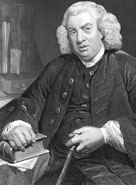The 1st English Dictionary
The first definitive English dictionary was compiled by, the famous (and infamous) Dr. Samuel Johnson in April 1755.
“A Dictionary of the English Language,” also called Johnson’s Dictionary, was the work of one larger-than-life figure in English literary history. He created a widely imitated style of biography and literary criticism in addition to setting the meticulous tone of reference books. His cause was to make English, especially the great classics, accessible for all readers. His dictionary was the first book to address English as it was written and spoken. It was the first to include context-based information about English. And it was the first to attempt to enforce a standard of spelling and grammar upon unruly English, which had no equivalent of an academy to defend its use as proper or improper.
To understand Dr. Johnson’s undertaking, we first have to tell you about the state of English lexicography in the middle of the 18th Century: It did not exist. There were a handful of glossaries of difficult words, but overall, there was no reference for the English reader to consult if a word was unfamiliar. In addition, books were becoming widely available and literacy in England was growing.
Several book publishers got together and commissioned Dr. Johnson to compile a dictionary similar to the one created by the French Academy. In France, that effort took 40 scholars 40 years to complete. Johnson, in a barb aimed at the supposed inferiority of the French, said he could do it in three: “This is the proportion. Let me see; forty times forty is sixteen hundred. As three to sixteen hundred, so is the proportion of an Englishman to a Frenchman.” It actually took Johnson 9 years to complete. However he did it single-handedly, with only clerical assistance to copy out the illustrative quotations that he had marked in books. A remarkable feat of work. Johnson produced several revised editions during his life.
The dictionary was huge: Its bulk was made up of the finest paper available, printed on pages cut to 18 inches in height. At the time, only special editions of the Bible had been printed on anything nearly so extravagant. Flipping open to any page, the curious reader could scan double columns of small type. Entries included a definition and a full-length quotation from a literary source. Notes on the word’s usage provided a context. The original included 42,773 entries with 114,000 literary examples. As previously mentioned, the examples were the only portion of the dictionary that assistants helped in compiling. Johnson wrote all the definitions himself with humor and style:
“Oats: a grain which in England is generally given to horses, but in Scotland supports the people.” “Monsieur: a term of reproach for a Frenchman.”
Until the completion of the Oxford English Dictionary, 173 years later, Johnson’s was viewed as the pre-eminent English dictionary.








You must be logged in to post a comment.